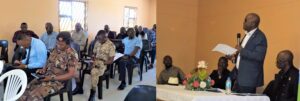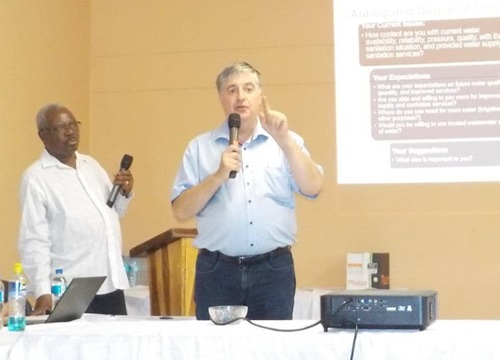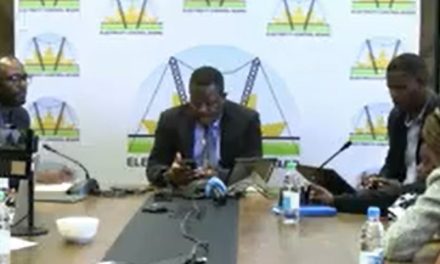By Elina-Ombili Shishaki /
The Namibia Water Corporation (NamWater) yesterday held a public hearing and stakeholders consultations for its Oshikoto Region’s “Water Master Plan” project in Omuthiya.
NamWater being the country’s biggest water supplier has initiated a project which aims to produce a long-term plan for sustainable water provision in the Northern-Central areas of the country.
The main objective of this project is to ensure improved living conditions, good health and economic development in Central Northern regions of Namibia by ensuring sufficient provision of water for people, livestock and irrigation in both rural and urban areas.
Stakeholders from various institutions gathered to voice their opinions and expectations on the current water issues and concerns to be considered in the water master plan project in order to ensure that there are improved services in water provision and that people have access to clean water in the future.
Despite the efforts by NamWater to tackle the water crisis in the northern areas, there has been water scarcity in some areas due to a rapid increase in the population which greatly affected people and livestock due to high water demand.
Mr Johann Pichler-Stainern, a consultant for the Water Master Plan project who was the expert and main speaker at the meeting mentioned that this project covers areas in Oshana, Oshikoto, Ohangwena and Omusati and also some areas of Opuwo.
“We have insufficient water storage capacity, though there are pipelines and reservoirs they are too old which may delay the supply of water. In most cases rural customers use significantly more water per capita than anticipated,” Pichler-Stainern said.
“We encounter operational issues which may lead to water supply interruptions at times.
“Additionally, groundwater partly with high levels of salinity or sulphate and fluoride in Opuwo and Eenanha requires expensive treatment.
“In areas like Helao Nafidi non-conventional water sources are yet to be in use and there is a provision of treated wastewater for irrigation purposes. However the challenge remains that livestock use untreated water for drinking.”
Pichler-Stainern pointed out that due to high heats there has been a high water loss due to high evaporation of which Opuwo experience a 40% water loss.
“[The situation of] water loss needs to be enhanced, as water is a scarce resource in the north central Namibia. There is a need of bulk water capacity especially at Olushandja dam due to high evaporate,” he stressed.
He further stated that although NamWater is working tirelessly to ensure uninterrupted water supply to consumers, illegal water connections to the NamWater lines remains the biggest constraint.
He also said that inadequate capacities of infrastructure to meet the future water demands like treatment plants, pumps, storage reservoirs, and distribution systems hinder the processes of supplying water.
Effects of climate and land-use changes, floods and drought remain a challenge too.
“There is a need for better collaboration between NamWater, local authorities and regional authorities. The most important part of this project is to ensure public consultation processes for participatory approach and involvement of target groups,” said Pichler-Stainern.
He urged stakeholders to create public awareness regarding the use of scarce water resources and water saving conduct for improved water demand management.
Speaking at the same meeting the Oshikoto Regional Governor Mr Penda Ya Ndakolo emphasised that this project is an opportunity for stakeholders to share knowledge and find innovative solutions that secure reliable water supply for the current and future generations.

In the photo: Water Master Plan project consultant Mr Johann Pichler-Stainern unpacking NamWater’s plans to tackle water problems in the northern regions, next to him is veteran author Mr Angula T Ndjembo translating the presentations for Oshiwambo speaking audiences. In another image are some stakeholders from different institutions who came to give their inputs during the public hearing on Namwater’s Master plan project; Oshikoto Governor, Mr Penda Ya Ndakolo, was among them.







